#Learning and Development Solutions
Explore tagged Tumblr posts
Text
Transforming STM and Educational Content Distribution with End-to-End Digital Publishing
In today’s fast-paced, technology-driven world, the need for streamlined, efficient, and innovative solutions in digital publishing is more critical than ever. For sectors like STM (Science, Technology, and Medicine) and education, digital publishing plays a pivotal role in disseminating information, fostering learning, and supporting research and knowledge sharing. End-to-end digital publishing solutions have emerged as an essential tool for organizations, providing a comprehensive approach to creating, managing, and distributing digital content effectively.
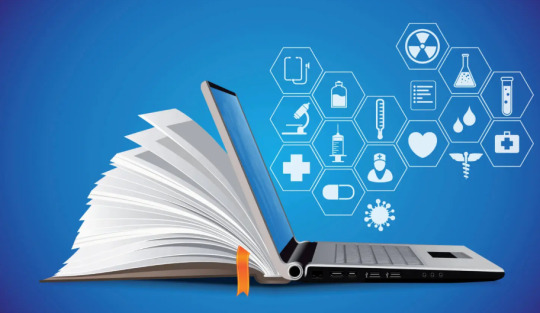
What Are End-to-End Digital Publishing Solutions?
End-to-end digital publishing solutions refer to a complete system that supports the entire lifecycle of content creation, management, and distribution. These solutions incorporate tools, platforms, and technologies that allow publishers to handle everything from content creation to the final output, whether it’s in the form of eBooks, journals, interactive content, or educational materials. These solutions are designed to cater to the specific needs of industries like STM and education, where accuracy, speed, and accessibility are paramount.
Key Components of End-to-End Digital Publishing Solutions
Content Creation The foundation of any digital publishing effort begins with content creation. For STM and educational publishers, content can range from research articles, journals, textbooks, and online courses, to multimedia-rich educational resources. Advanced tools for content creation include word processors, LaTeX integration, image editing tools, and video creation platforms. Content can be created by multiple authors across different geographical locations, with integrated cloud collaboration tools that enable real-time updates and feedback.
Content Management and Collaboration Managing a large volume of content is no easy task, especially when content is continuously being updated, reviewed, or revised. A centralized content management system (CMS) allows publishers to track and manage content, ensuring a seamless workflow between authors, editors, and production teams. Collaboration tools within a CMS are particularly useful in the STM field, where multiple experts often need to provide feedback and make revisions. Educational publishers benefit similarly, as multiple stakeholders—teachers, instructional designers, and technologists—can collaborate on the content and structure of materials.
Metadata and SEO Optimization For STM and educational publishers, metadata plays a crucial role in ensuring that digital content is easily discoverable by readers, researchers, and students. An end-to-end publishing solution incorporates metadata management, which ensures that each piece of content is properly tagged, categorized, and searchable. This is vital for STM publishers, whose content needs to be highly accurate and discoverable for research purposes. Additionally, SEO optimization ensures that educational content reaches the right audience via search engines.
Content Formatting and Conversion The next step in the digital publishing process is formatting and conversion. For STM publishers, content needs to be formatted for various platforms such as academic journals, PDFs, or eBooks. Educational content may need to be converted into e-learning modules or interactive PDFs. End-to-end solutions automate the conversion process into multiple formats while ensuring the integrity of the content remains intact. This is especially important in STEM, where visual clarity and data accuracy are critical.
Interactive and Multimedia Integration Modern digital publishing in education requires the integration of multimedia elements such as video lectures, interactive quizzes, and virtual labs. These elements engage learners and enhance the learning experience. In STM, interactive graphs, datasets, and simulations are often embedded into content to allow readers to interact with complex information. End-to-end solutions support seamless integration of these multimedia elements, providing educational content with interactivity and engagement while maintaining scientific accuracy.
Digital Distribution Once content is created, managed, and formatted, the next step is distribution. An end-to-end digital publishing solution ensures that content is accessible across various digital platforms—websites, mobile apps, learning management systems (LMS), and even e-commerce platforms. For STM publishers, digital libraries and repositories (such as PubMed and JSTOR) are essential for distributing research and scholarly work to global audiences. Educational publishers rely on distribution through e-learning platforms, school portals, and academic bookstores to reach students and instructors.
Analytics and Reporting Analytics and reporting are key components of a comprehensive publishing solution. By integrating real-time data and user analytics, STM and educational publishers can assess how their content is being consumed, identify popular articles or textbooks, and gather feedback on how educational materials are helping students learn. This data-driven approach allows publishers to refine their offerings, improve user engagement, and better serve their target audience.
Monetization and Licensing For both STM and educational publishers, monetization plays a significant role in the digital publishing process. End-to-end solutions incorporate tools for subscription management, pay-per-view access, licensing, and rights management. For STM publishers, this can involve licensing research papers, journals, or patents, while educational publishers might offer paid course content, digital textbooks, or training modules. These systems help streamline revenue generation through content while ensuring compliance with intellectual property laws.
The Benefits of End-to-End Digital Publishing Solutions for STM and Education
Improved Efficiency and Workflow By integrating all stages of the publishing process into one unified solution, publishers can automate repetitive tasks, reduce manual intervention, and speed up the time it takes to publish new content. This results in faster distribution of research findings, educational materials, and academic publications.
Scalability As both the STM and education sectors continue to expand digitally, scalability is critical. End-to-end solutions are designed to grow alongside these industries, accommodating the increasing volume of content, users, and platforms. They can easily handle a growing repository of research papers, educational materials, and multimedia content.
Enhanced Accessibility Accessibility is a core value in both education and scientific communication. End-to-end solutions ensure that content is easily accessible to users across the globe, regardless of their device, location, or internet connection. These platforms also offer features like text-to-speech, closed captioning, and language localization, making content more inclusive.
Data-Driven Insights Analytics features integrated into digital publishing solutions help publishers track content performance and make data-driven decisions to optimize their offerings. Understanding how users interact with content allows STM and educational publishers to refine their strategies, improve engagement, and enhance the quality of their resources.
Cost-Effective Solutions Traditional publishing methods often require heavy investment in printing, distribution, and physical storage. By going digital, publishers reduce these costs significantly. An end-to-end digital publishing solution streamlines the process, leading to cost-effective solutions for both content creation and distribution.
Conclusion
In the rapidly evolving world of STM and education publishing, end-to-end digital publishing solutions are essential for staying competitive and relevant. By providing a comprehensive framework for content creation, management, distribution, and monetization, these solutions offer organizations the tools they need to meet the demands of their audiences and stay ahead of the curve. Whether it’s streamlining research distribution, enhancing e-learning experiences, or driving engagement, end-to-end solutions are key to the future of digital publishing in these industries.
#Corporate Training Solutions#Custom eLearning Development#Learning and Development Solutions#End-to-end publishing services#STM publishing solutions#Education publishing solutions#Digital publishing transformation#AI-powered publishing solutions
0 notes
Note
miss Toskarin you’re not convincing me that Skyrim was the ruin of all western rpgs. In fact you’re convincing me that the issues began with oblivion.
I'd better be careful or else I might convince you of my less loudly-held beliefs
#I liked oblivion well enough but it's got a lot of Very Serious problems that were never solved and instead festered forward into genre norm#although technically if you want to get more specific here#the problems that I complain most often about now actually started under the surface of morrowind's development#and intensified with the reception to tribunal#and then caught on fire with the lessons learned from bloodmoon (which is proto-oblivion in a lot of ways)#as with so many things the damage was more in the wrong lessons being learned from games with scrappy development cycles#and how those became incredibly toxic when applied as the standard for development rather than a freak accident of planning#consider how oblivion passively fucking up your character was a solution to people trying to play off-build in morrowind#and how skyrim being incredibly easy was a solution to oblivion's level-rotting#and how both of these solutions are solving a symptom by removing friction without replacing it#which is further incentivised because the game now has fewer features that would turn off someone who would otherwise not play an rpg
73 notes
·
View notes
Text
The Boyfriend-participants and what they learned/taught
Usak
Learned: To open up and express his feelings
Taught: Gensei and the others to fulfill their visit at the Green Room
Gensei
Learned: To express himself and his feelings
Taught: Ryota to do everything he could and spend his time without any regrets
Taeheon
Learned: To be proud of himself for who he is
Taught: Shun that he’s never obligated to do something he doesn’t want, but still has to be considerate of other feelings
Ikuo
Learned: To not come in between people, even if the intentions are good
Taught: The others to keep on trying until the other person becomes interested
Ryota
Learned: To stay true to himself and express the feelings that were important
Taught: Gensei to be true to himself (and taught everyone to make good coffee)
Dai
Learned: To show his love through actions and not just words
Taught: Shun and everyone else communication is key
Shun
Learned: To not be so quick to judge, because he one(s) you least expect way be become very meaningful to you
Taught: The importance of expressing your feelings through actions
Alan
Learned: To respect boundaries and let things go slowly
Taught: Dai think positively and remember his kindness
Kazuto
Learned: To put words into his emotions
Taught: Alan to let things take the time it needs and it will be worth it in the end
#I know some learned/taught more than one thing but these were the ones that came to me first#I love how everyone had their own development and how they collectively helped each other grow#I still want to know what Dai and Alan meant when they told Ryota that he saved them#I also love how they learned from their mistakes and actively tried to come up with solutions rather than just pointing at each other#unlike western reality shows where all they do is yell at each other for the tiniest thing#I’m actually so proud of all of them how far they’ve all come#the boyfriend
10 notes
·
View notes
Text
9 AI Tools to Build Websites and Landing Pages: Revolutionizing Web Design

In the ever-evolving world of web design, staying ahead of the curve is essential to creating visually stunning and highly functional websites. With the advent of artificial intelligence (AI), designers and developers now have a powerful set of tools at their disposal to revolutionize the web design process. AI website design tools offer innovative solutions that streamline and enhance the creation of websites and landing pages.
In this article, we will explore nine AI tools that are reshaping the web design landscape, discuss their various types, and highlight the benefits of using AI tools for website building.
1. Wix ADI:
Wix ADI (Artificial Design Intelligence) is a game-changer for website building. It utilizes AI algorithms to automatically generate customized website designs based on user preferences and content inputs. With Wix ADI, even users with no design experience can create stunning websites in a matter of minutes.
2. Grid:
Grid is an AI-powered website builder that uses machine learning to analyze design principles and create visually pleasing websites. It takes user inputs, such as branding elements and content, and generates unique layouts and designs tailored to the user's needs. Grid eliminates the need for manual coding and design expertise, making it accessible to users of all skill levels.
3. Firedrop:
Firedrop is an AI chatbot-based website builder that guides users through the entire website creation process. The AI-driven chatbot asks questions, gathers information, and generates a personalized website design. It also offers real-time editing and customization options, allowing users to make changes effortlessly.
4. Bookmark:
Bookmark is an AI website builder that combines artificial intelligence with human assistance. It provides an intuitive interface where users can select a design style and content preferences. The AI algorithms then generate a website layout, which can be further customized using Bookmark's drag-and-drop editor. Users also have access to AI-driven features like automated content creation and personalized marketing recommendations.
5. Adobe Sensei:
Adobe Sensei is an AI and machine learning platform that enhances the capabilities of Adobe's creative tools, including website design software like Adobe XD. Sensei analyzes user behavior, content, and design elements to offer intelligent suggestions, automate repetitive tasks, and speed up the design process. It empowers designers to create impactful websites with greater efficiency and creativity.
6. The Grid:
The Grid is an AI-driven website builder that uses machine learning to analyze user content and generate unique, responsive website designs. It employs a card-based layout system, automatically arranging and resizing content for optimal visual appeal. The Grid's AI algorithms continuously learn from user feedback, improving the quality of designs over time.
7. Elementor:
Elementor is a popular AI-powered plugin for WordPress that simplifies the process of building landing pages. It offers a drag-and-drop interface with a wide range of pre-designed templates and widgets. Elementor's AI features include responsive editing, dynamic content integration, and intelligent design suggestions, enabling users to create professional landing pages efficiently.
8. Canva:
Although primarily known as a graphic design tool, Canva incorporates AI elements to make website design accessible to non-designers. It offers a user-friendly interface with customizable templates, stock images, and drag-and-drop functionality. Canvas AI algorithms suggest design elements and provide automatic resizing options, making it easier to create visually appealing websites and landing pages.
9. Sketch2React:
Sketch2React is an AI tool that simplifies the process of converting design files from Sketch (a popular design software) into interactive, code-based websites. It automates the conversion process, reducing the need for manual coding and accelerating the development timeline. Sketch2React's AI capabilities ensure that the resulting websites are responsive and optimized for different devices.
Benefits of Using AI Tools for Website Development:
1. Time-saving: AI tools automate repetitive and time-consuming tasks, allowing designers and developers to focus on creativity and strategic aspects of web design.
2. Cost-effective: AI tools eliminate the need for extensive coding knowledge or hiring professional designers, making website building more affordable for businesses of all sizes.
3. User-friendly: AI website builders provide intuitive interfaces, drag-and-drop functionality, and automated design suggestions, making them accessible to users with limited technical skills.
4. Personalization: AI algorithms analyze user preferences and content inputs to generate personalized website designs that align with the brand and target audience.
5. Enhanced creativity: AI tools offer design suggestions, templates, and automated content creation features that inspire creativity and enable designers to experiment with new ideas.
6. Improved user experience: AI-driven websites are optimized for responsiveness, usability, and accessibility, resulting in enhanced user experiences and increased engagement.
Conclusion:
AI tools have revolutionized the web design industry by simplifying and enhancing the process of building websites and landing pages. Whether it's generating personalized designs, automating repetitive tasks, or offering intelligent design suggestions, AI-driven solutions empower designers and non-designers alike to create visually stunning and highly functional websites. By leveraging the power of AI, businesses can save time, reduce costs, and deliver exceptional user experiences, ultimately driving success in the digital landscape. As AI technology continues to advance, we can expect even more innovative tools to emerge, further revolutionizing the field of web design. Embracing these AI tools is key to staying at the forefront of web design trends and creating websites that captivate audiences and achieve business goals.
#Hire Machine Learning Developer#Machine Learning Development in India#Looking For Machine Learning Developer#Looking For Machine Learning Dev Team#Data Analytics Company#Vision AI Solution#Vision AI Development#Vision AI Software#Vision API#Vertex AI Vision#Web Development#Web Design#AI Tool
2 notes
·
View notes
Text
Build Your Digital Castle: Castle Interactive - Expert Website Development
Craft a Website that Converts with Confidence:
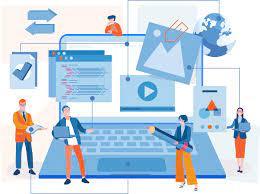
Castle Interactive isn't just another website development company. We're your trusted partners, dedicated to building captivating online experiences that drive results.
Here's why you choose Castle Interactive:
Bespoke Websites, Tailored to Your Vision: From simple brochures to complex e-commerce platforms, we craft websites that reflect your unique brand and goals.
Expert Developers, Cutting-Edge Technologies: We leverage the latest tools and trends to build secure, scalable, and mobile-friendly websites.
Data-Driven Design, Focused on Conversion: We analyze user behavior and integrate conversion optimization strategies to maximize your ROI.
Seamless Collaboration, Transparent Communication: We believe in open communication and keep you informed throughout the entire development process.
Ongoing Support, Your Growth Partner: We offer comprehensive maintenance and support packages to ensure your website continues to thrive.
Ready to build your online castle? Contact Castle Interactive today for a free consultation and let's bring your digital vision to life!
#web developing company#webdesign#application development#website#artificial intelligence#graphic design#application modernization#programming#machine learning#cloud solutions
3 notes
·
View notes
Text
IETM for Beginners A Quick Guide to IETM Code and Pixels
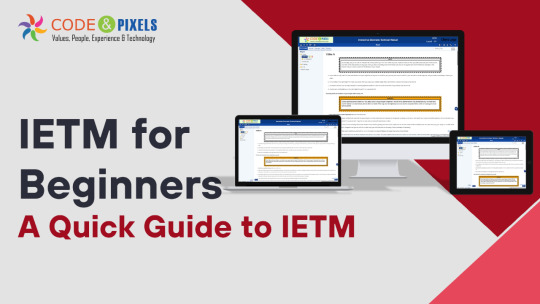
IETM: Interactive Electronic Technical Manual
Training Aids to Defence Client
If you are a supplier of defence then along with the system/equipment you also need to provide Training Aids
(CBT) — Computer-Based Training
Charts and Bloups
Video Film
Training Work Modules
Manuals Hard Copies
IETM
Evolution of Documentation in Defence
Before — Hardcopies and PDFs in DVDs (Upto 2015)
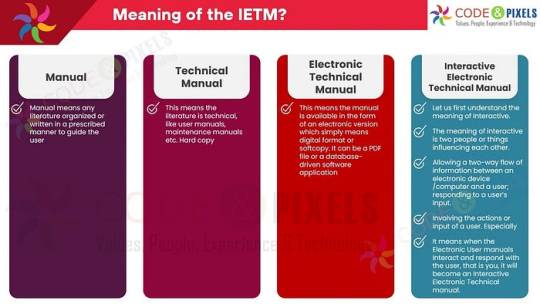
What is the meaning of the IETM?
Manual: Manual means any literature organized or written in a prescribed manner to guide the user.
TechnicalManual: This means the literature is technical, like user manuals, maintenance manuals etc. Hard copy
Electronic Technical Manual: This means the manual is available in the form of an electronic version which simply means digital format or softcopy. It can be a PDF file or a database-driven software application.
Interactive Electronic Technical Manual:
Let us first understand the meaning of Interactive. The meaning of interactive is two people or things influencing each other.
Allowing a two-way flow of information between an electronic device /computer and a user; responding to a user’s input.
Involving the actions or input of a user. Especially
It means when the Electronic User manuals Interact and respond with the user, that is you, it will become an Interactive Electronic Technical manual.
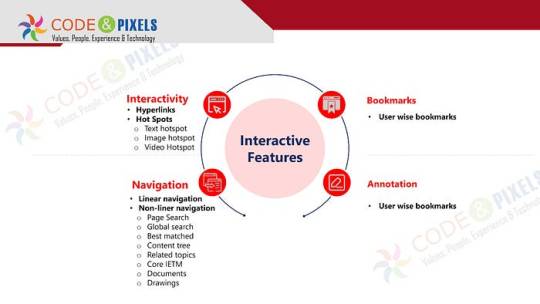
Interactive Features
Interactivity
Hyperlinks
Hot Spots
Text hotspot
Image hotspot
VideHotspot
Bookmarks
User wise bookmarks
Navigation
Linear navigation
Non-liner navigation
Page Search
Global search
Best matched
Content tree
Related topics
Core IETM
Documents
Drawings
Annotation
User wise bookmarks
The documents and pages are many hence, for easy and fast accessibility complete content is converted and stored as a database.
Whenever the user wants some information, IETM software produces the information in a fraction of a second.
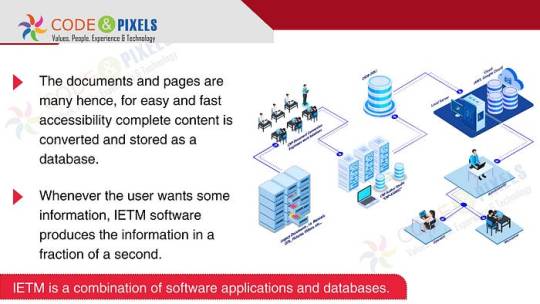
Use or Purpose of the IETM?
The purpose of the Manual is to give information related to the equipment to the end user for quick reference.
All the technicality is written in detail so that when an issue arises, the user can refer to the manual, as every time OEM or technical person or subject matter expert might not be available on the spot to resolve the issue.
If the manual has 10 pages users can refer easily.
But any system used by the defence will have multiple manuals and thousands of page counts and many times a user has to cross-refer between manuals, intra-manual and inter-manual to resolve the issue.
Referring to 10- 15 hard-copy or even soft-copy books simultaneously will be difficult and time-consuming.
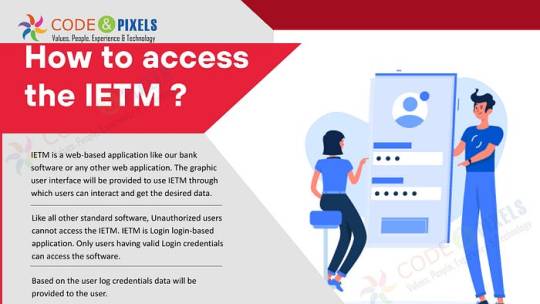
How to access the IETM ?
IETM is a web-based application like our bank software or any other web application. The graphic user interface will be provided to use IETM through which users can interact and get the desired data.
Like all other standard software, Unauthorized users cannot access the IETM. IETM is a Login - login-based application. Only users having valid Login credentials can access the software.
Based on the user log credentials data will be provided to the user.
IETM has 2 types of Users and one Administrator
Maintainer
Operator
If the operator logs in, the user gets all the content related to operator use, similarly if the maintainer logs in only maintenance-related content is visible for that user.
Ideally, all the content is available for both users, because the purpose of the IETM is to refer to the manual to fix the issue.
Administrators can create users who can see the user’s navigation and log-in history and interact with the users using user dashboards through Annotations.
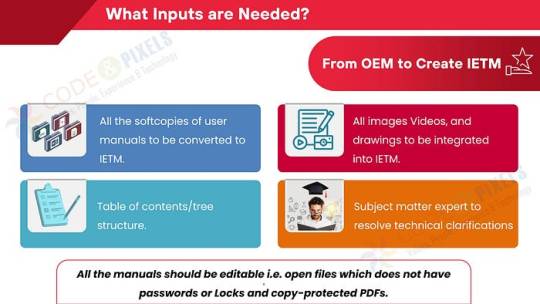
What Inputs are Needed? (From OEM to Create IETM)
All the softcopies of user manuals to be converted to IETM.
All images Videos, and drawings to be integrated into IETM.
Subject matter expert to resolve technical clarifications
Table of contents/tree structure.

Minimum Hardware Requirements?
NO High-end hardware or servers are required to run IETM.
However, if more concurrent users, then a good configuration server with good LAN connectivity must be ensured.
i3 with 8 GB RAM systems is the minimum configuration required for the server or for Node.
Deliverables
BASED DB (Manuals are covered in the Database)
IETM VIEWER Software
User Manual and Installation Manual
Standards — compliance
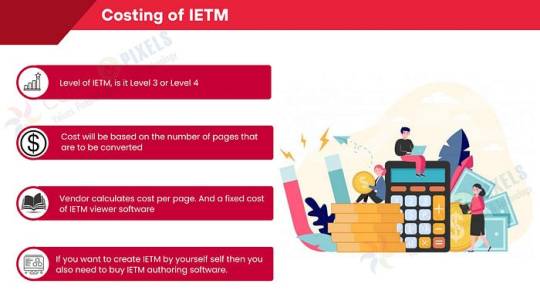
Costing of IETM: (Interactive Electronic Technical Manual)
Level of IETM, is it Level 3 or Level 4
Cost will be based on the number of pages that are to be converted
The vendor calculates the cost per page. And a fixed cost of IETM viewer software
If you want to create IETM by yourself self then you also need to buy IETM authoring software.
What are these Levels?
Level — 1 is any PDF file
Level — 2 is a PDF file with hyperlinks from the table of contents to the body etc.
Level — 3 is an HTML application. More hyperlinks, simple search, a content tree having log a screen with a hardcoded username and password and supplied in the format of EXE so that Windows can easily open
Level — 4 is Software plus Content/manuals converted as Database
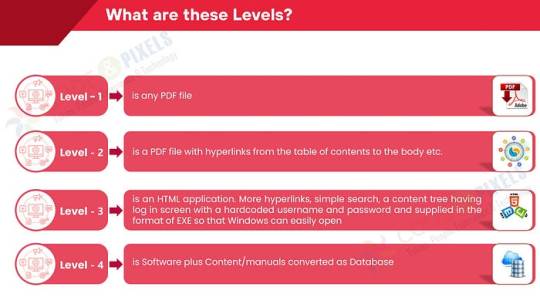
Regarding Level — 5, rest assured, till 2028 it will be Level — 4 only. As of now, there is nothing practically called Level — 5. Few are calling virtual reality and Augmented reality and Artificial intelligence Level — 5.
Pulling data from many user inputs and analyzing and giving results are done in Level — 5. IETM software cannot pull the data from various real-time points as No OEM will give the real-time information to third-party software directly. Yes, if the information is available offline, then that information can be imported into IETM and can be used as a reference.

#ietm#software#technology#ietm developement#ietm code and pixels ietm hyderabad#ietm software#elearning#code and pixels#ietm level iv#codeandpixels#ietm level 4 software requirements#technical documentation#ietm document#ietm documentation#interactive electronic technical manual#Ietm Service Providers#Ietm Software Designers of India#Software Development Company#Elearning Solutions Company#E Learning Content Development Company#Online Education#Digital Education#Digital Content#Software Development Solutions#Elearning#Ietm Developers#Econtent Development#Elearning Solutions Providers#Econtent Developers#Econtent
3 notes
·
View notes
Text

https://www.istudiotech.in/artificial-intelligence-development-company-in-chennai-india/
iStudio Technologies is a leading Artificial Intelligence (AI) Development Company in Chennai, offering cutting-edge solutions that empower industries like education, finance, and mobile apps. Their services include AI chatbots, voice assistants, automated grading, secure online assessments, and hyper-personalized learning systems to enhance productivity, decision-making, and user experience.
#AI Development#Artificial Intelligence Chennai#Machine Learning Solutions#AI Chatbot#EdTech AI#AI in Education#AI Software Company#Smart Learning Tools#Automation in Education#AI Developers Chennai#web designing company in chennai
0 notes
Text

Elevate Your Mobile App with AI & Chatbots Build Your AI-Powered App: Unlock Next-Gen Capabilities Master the integration of AI and chatbots with our 2025 guide, designed to help you create next-gen mobile applications boasting unmatched intelligence. Ready to elevate? This comprehensive guide equips you with the knowledge to seamlessly integrate AI chatbots and advanced AI into your mobile app for a truly intelligent and future-ready solution.
#Generative AI Software Development | openai chatbot#We build custom AI software#OpenAI chatbots#machine learning#computer vision#and RPA solutions. Empower your business with transformative#intelligent AI#Taxi Booking & Ride Sharing App Development Company#Food Delivery App Development Company | Build Food App#Leading eCommerce App Development Company|Hire Developers#Top Education App Development Company | LMS App Development#Custom Real‑Estate App Development Company | Custom CRM App#On‑Demand Healthcare Mobile App Development Company#Fitness & Wellness App Development Company | Calorie Counter App#Affordable Dating App Development Company | Tinder Clone App#Custom Laundry & Dry‑Cleaning App Development Company#On‑Demand Pickup and Delivery App Development Company#Best Social Media & Networking App Development Company#on-demand Beauty Service App Development#Online Medicine Delivery & Pharmacy App Development Company#Custom On-Demand Delivery App Development Company#Android & IOS Marketplace App And Software Development Company#On‑Demand Grocery Delivery App Development Company
0 notes
Text
CHATBOTS ARE REVOLUTIONIZING CUSTOMER ENGAGEMENT- IS YOUR BUSINESS READY?

CHATBOTS & AI: FUTURE OF CUSTOMER ENGAGEMENT
Customers want 24/7 access, personalized experiences, and quick replies in today’s digital-first environment. It can be difficult to manually meet such requests, which is where AI and machine learning-powered chatbots come into play.
WHAT ARE CHATBOTS?
A chatbot is a computer software created to mimic human speech. Natural language processing and artificial intelligence (AI) enable chatbots to comprehend customer enquiries, provide precise answers, and even gain knowledge from exchanges over time.
WHY ARE CHATBOTS IMPORTANT FOR COMPANIES?
24/7 Customer Service
Chatbots never take a break. They offer 24/7 assistance, promptly addressing questions and enhancing client happiness.
Effective Cost-Scaling
Businesses can lower operating expenses without sacrificing service quality by using chatbots to answer routine enquiries rather than adding more support staff.
Smooth Customer Experience
Chatbots may recommend goods and services, walk customers through your website, and even finish transactions when AI is included.
Gathering and Customizing Data
By gathering useful consumer information and behavior patterns, chatbots can provide tailored offers that increase user engagement and conversion rates.
USE CASES IN VARIOUS INDUSTRIES
E-commerce: Managing returns, selecting products, and automating order status enquiries.
Healthcare: Scheduling consultations, checking symptoms, and reminding patients to take their medications.
Education: Responding to questions about the course, setting up trial sessions, and getting input.
HOW CHATBOTS BECOME SMARTER WITH AI
With each contact, chatbots that use AI and machine learning technologies get better. Over time, they become more slang-savvy, better grasp user intent, and provide more human-like responses. What was the outcome? A smarter assistant that keeps improving to provide greater customer service.
ARE YOU READY FOR BUSINESS?
Using a chatbot has become a strategic benefit and is no longer optional. Whether you manage a service-based business, an online store, or a developing firm, implementing chatbots driven by AI will put you ahead of the competition.
We at Shemon assist companies in incorporating AI-powered chatbots into their larger IT offerings. Smart chatbot technology is a must-have if you want to automate interaction, lower support expenses, and improve your brand experience.
Contact us!
Email: [email protected]
Phone: 7738092019
#custom software development company in india#software companies in india#mobile app development company in india#web application development services#web development services#it services and solutions#website design company in mumbai#digital marketing agency in mumbai#search engine optimization digital marketing#best e commerce websites development company#Healthcare software solutions#application tracking system#document parsing system#lead managment system#AI and machine learning solutions#it consultancy in mumbai#web development in mumbai#web development agency in mumbai#ppc company in mumbai#ecommerce website developers in mumbai#software development company in india#social media marketing agency mumbai#applicant tracking system software#top web development company in mumbai#ecommerce website development company in mumbai#top web development companies in india#ai powered marketing tools#ai driven markeitng solutions
0 notes
Text

Why EdTech in Corporate Training Drives Retention Rates
As industries evolve at breakneck speed, the demand for agile, well-equipped professionals grows more urgent. Companies face rising pressure to upskill employees rapidly, consistently, and cost-effectively. That’s where EdTech in corporate training steps in—not just as a convenience, but as a strategic necessity. Digital learning solutions are revolutionizing traditional training programs, delivering immersive, measurable, and personalized development that helps bridge critical skills gaps.
The Rise of EdTech in the Modern Workplace
EdTech has emerged as a powerful response to the limitations of traditional training methods. In a digital-first world, businesses need real-time solutions that align with fast-paced market demands. Educational technology blends software, analytics, and content delivery systems to create dynamic learning environments that adapt to different industries and employee roles. This shift from static training manuals to interactive platforms marks a significant step in workforce development.
How Digital Learning Enhances Corporate Training
EdTech reshapes corporate training by integrating multimedia content, real-time assessments, gamification, and mobile accessibility. Employees engage more deeply when learning materials are interactive and immediately relevant to their roles. Digital learning platforms also allow companies to standardize training across multiple locations, ensuring consistency in employee knowledge and performance.
Personalized Learning and Performance Metrics
One-size-fits-all training is becoming obsolete. EdTech solutions utilize AI-driven recommendations and learning analytics to tailor content to individual learning styles and paces. These platforms track employee engagement, completion rates, and assessment scores, giving HR and L&D teams actionable data to refine strategies and ensure ROI on training initiatives.
Closing the Skills Gap with Real-Time Upskilling
The skills gap is not a future problem; it's a present crisis for many industries. EdTech addresses this by delivering on-demand microlearning modules, certification programs, and scenario-based simulations that focus on current job requirements. Employees can upskill while working, keeping their competencies aligned with evolving job roles without major disruptions to productivity.
Scalable, Cost-Effective Training for a Global Workforce
Multinational organizations benefit greatly from the scalability of EdTech. Instead of arranging costly in-person sessions, businesses can deploy training programs globally with minimal logistical challenges. Cloud-based platforms allow for uniform content delivery, localized customization, and instant updates, making training both affordable and efficient.
Future Trends: What’s Next for EdTech in Corporate Training
As AI, VR, and AR technologies mature, EdTech will offer even more immersive learning experiences. Simulated environments and virtual role-playing can prepare employees for complex scenarios in industries like healthcare, finance, and engineering. The future of EdTech lies in creating intelligent ecosystems where learning is continuous, adaptive, and deeply integrated with day-to-day work.
For more info visit https://bi-journal.com/how-edtech-transforms-workforce-training/
Conclusion
EdTech in corporate training is no longer a supplemental resource—it’s a fundamental pillar of modern workforce strategy. By offering flexible, scalable, and personalized learning solutions, it empowers companies to bridge skill gaps, retain talent, and stay competitive in rapidly changing industries. As technology continues to evolve, so too will the ways we educate and empower our teams.
#EdTech#Corporate Training#Digital Learning#Workforce Development#Employee Training#Skills Gap#Learning Technology#Online Training Solutions#Personalized Learning#HR Tech
0 notes
Text
The Ultimate Guide to Choosing an LMS Development Company in 2025
In today’s fast-paced digital world, businesses and educational institutions are increasingly turning to Learning Management Systems (LMS) to deliver seamless, engaging, and scalable training programs. Whether you're a corporate entity aiming to upskill employees or an academic organization enhancing student learning, partnering with a reliable LMS development company is crucial to building a tailored e-learning solution. But with countless providers out there, how do you choose the right one? This guide dives into the key factors to consider, the benefits of custom LMS solutions, and why 2025 is the perfect time to invest in professional LMS development.

Why Invest in a Custom LMS in 2025?
The e-learning industry is booming, with the global LMS market expected to grow significantly in the coming years. A custom LMS offers unmatched flexibility, allowing organizations to create training environments that align perfectly with their unique goals. Here are some compelling reasons to invest in a custom LMS:
Scalability: A tailored LMS grows with your organization, accommodating more users and content as needed.
Brand Alignment: Custom themes and designs ensure your LMS reflects your brand identity.
Enhanced Engagement: Interactive features like gamification, quizzes, and multimedia keep learners hooked.
24/7 Accessibility: Cloud-based LMS solutions provide access to training materials anytime, anywhere.
Cost Efficiency: Eliminate expenses like printed materials or instructor travel with digital learning.
To unlock these benefits, partnering with an experienced LMS development company is essential. They bring technical expertise and innovative solutions to create a platform that drives results.
Key Features to Look for in an LMS Development Company
Not all LMS development companies are created equal. To ensure you select a partner that delivers a high-quality, future-proof solution, consider these critical factors:
1. Expertise in Custom LMS Solutions
A reputable LMS development company should have a proven track record of building bespoke platforms tailored to diverse industries. Look for a provider with experience in:
Developing intuitive user interfaces for learners and administrators.
Integrating advanced features like AI-driven analytics, gamification, and social learning.
Customizing platforms like Moodle, which is known for its flexibility and scalability.
2. Comprehensive Development Process
The right company follows a structured approach to LMS development, ensuring every aspect of your platform is optimized. This includes:
Requirement Analysis: Understanding your business goals and learner needs.
Design and Prototyping: Creating user-friendly designs and testing prototypes.
Development and Integration: Building the platform and integrating it with existing systems like CRM or HR software.
Testing and Deployment: Conducting rigorous testing to ensure a bug-free experience.
Ongoing Support: Providing maintenance and updates to keep your LMS running smoothly.
3. Focus on User Experience
A great LMS is one that learners love to use. The development company should prioritize:
Mobile-friendly designs for on-the-go learning.
Fast load times to reduce user frustration.
Engaging features like progress tracking, leaderboards, and personalized dashboards.
4. Security and Compliance
With data breaches on the rise, your LMS must prioritize security. Choose a company that:
Implements robust encryption and secure authentication.
Adheres to compliance standards like GDPR or HIPAA, depending on your industry.
Regularly updates the platform to address vulnerabilities.
5. Proven Portfolio and Client Reviews
Check the company’s portfolio to see examples of their past LMS projects. Positive client testimonials and case studies are strong indicators of reliability. For instance, IDS Logic, a leading LMS development company, has successfully delivered customized Moodle-based solutions for organizations worldwide, helping them achieve their training objectives.
Benefits of Partnering with a Professional LMS Development Company
Collaborating with an expert LMS development company offers numerous advantages over off-the-shelf solutions:
Tailored Functionality: Get features specific to your training needs, such as advanced reporting or multi-language support.
Seamless Integration: Integrate your LMS with third-party tools like Zoom, Slack, or payment gateways for a cohesive experience.
Long-Term Support: Benefit from ongoing maintenance, updates, and technical support to ensure your platform remains cutting-edge.
Cost-Effective Customization: While custom LMS development may seem expensive initially, it saves money in the long run by reducing reliance on multiple tools.
Why Choose IDS Logic for LMS Development?
When it comes to selecting a trusted LMS development partner, IDS Logic stands out for its expertise and client-centric approach. With over a decade of experience in e-learning solutions, IDS Logic offers:
Custom Moodle Development: Highly flexible and scalable platforms tailored to your needs.
End-to-End Services: From consultation to deployment and support, they handle it all.
Innovative Features: Incorporate AI, gamification, and social learning to boost engagement.
Global Reach: Serving clients worldwide with a focus on quality and affordability.
Their team of seasoned developers ensures that your LMS is not only functional but also engaging and secure, making it a top choice for businesses and educational institutions in 2025.
Tips for a Successful LMS Development Project
To maximize the success of your LMS development project, follow these best practices:
Define Clear Objectives: Outline your training goals and target audience before starting the project.
Collaborate Closely: Work closely with the development team to ensure your vision is realized.
Prioritize Scalability: Choose a platform that can grow with your organization.
Test Thoroughly: Conduct user acceptance testing to iron out any issues before launch.
Plan for Updates: Schedule regular updates to keep your LMS aligned with industry trends.
The Future of LMS Development in 2025
As technology evolves, LMS platforms are becoming more sophisticated. In 2025, expect to see:
AI-Powered Personalization: Adaptive learning paths based on user behavior.
Immersive Learning: Integration of AR/VR for hands-on training experiences.
Microlearning: Bite-sized modules for quick, effective learning.
Advanced Analytics: Deeper insights into learner progress and performance.
A forward-thinking LMS development company will incorporate these trends to ensure your platform remains competitive.
Conclusion
Choosing the right LMS development company is a game-changer for organizations looking to deliver impactful training programs. By prioritizing expertise, user experience, and scalability, you can create a custom LMS that drives engagement and achieves your business goals. Companies like IDS Logic exemplify the qualities to look for, offering tailored, innovative, and secure e-learning solutions.
Ready to transform your training initiatives? Contact a trusted LMS development company today and take the first step toward a smarter, more engaging learning experience in 2025.
#LMS Development#Custom LMS Solutions#E-Learning Platforms#Learning Management System#LMS Development Company
0 notes
Text
From Code to Cognitive – Atcuality’s Intelligent Tech Framework
Atcuality is redefining enterprise success by delivering powerful, scalable, and intelligent software solutions. Our multidisciplinary teams combine cloud-native architectures, agile engineering, and business domain expertise to create value across your digital ecosystem. Positioned at the crossroads of business transformation and technical execution, artificial intelligence plays a vital role in our delivery model. We design AI algorithms, train custom models, and embed intelligence directly into products and processes, giving our clients the edge they need to lead. From automation in finance to real-time analytics in healthcare, Atcuality enables smarter decisions, deeper insights, and higher efficiency. We believe in creating human-centered technology that doesn’t just function, but thinks. Elevate your systems and your strategy — with Atcuality as your trusted technology partner.

#seo services#artificial intelligence#iot applications#seo agency#seo company#seo marketing#digital marketing#azure cloud services#ai powered application#amazon web services#ai image#ai generated#ai art#ai model#technology#chatgpt#ai#ai artwork#ai developers#ai design#ai development#ai deep learning#ai services#ai solutions#ai companies#information technology#software#applications#app#application development
0 notes
Text

Castle Interactive LLC is a premier website development company dedicated to delivering cutting-edge digital solutions. With a focus on innovation and client satisfaction, we offer tailored website development services to meet the unique needs of businesses. Our team of skilled developers combines creativity with technical expertise to create visually stunning and functional websites. From responsive design to e-commerce solutions, we ensure that every project is executed with precision and professionalism. Trust Castle Interactive LLC to elevate your online presence and drive business growth.
#web developing company#webdesign#application development#website#artificial intelligence#graphic design#application modernization#programming#machine learning#cloud solutions
4 notes
·
View notes
Text
How DeepSeek AI & ChatGPT Are Transforming the Future of Artificial Intelligence
Explore how DeepSeek AI and ChatGPT are transforming industries with powerful AI solutions. Learn how Theta Technolabs, a leading AI development company in Dallas, empowers businesses with custom AI software, web app development, and machine learning solutions.
#DeepSeek AI#ChatGPT#AI development company#AI software development services#web app development services#machine learning solutions#Artificial Intelligence
0 notes
Text
#corporate training#learning and development#corporate training programs#corporate training solutions
0 notes